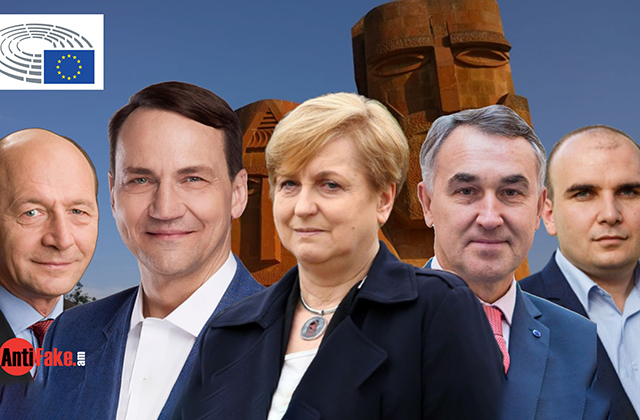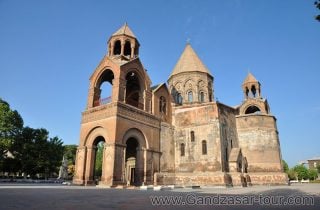Who is Enabling Azerbaijani Aggression in European Parliament. AntiFake.am’s Journalist Investigation

On June 4, the draft of the recommendation “European Parliament recommendation to the Council, the Commission and the Vice-President of the Commission / High Representative of the Union for Foreign Affairs and Security Policy on the Eastern Partnership, in the run-up to the June 2020 Summit” was sent to the members of the European Parliament and staff. Probably today it will be published on the EP website.
Earlier, politician, Ambassador Extraordinary and Plenipotentiary, Ambassador and Special Representative of the President of Armenia on Special Missions in 1992-1995, head of Armenian Security Service in 1994-1995, David Shahnazaryan stated that the European Union triggers Azerbaijan to start a new war. He also noted that European Parliament doesn’t consider the principles of “rejection of the use of force and threat of force” and “peaceful settlement”applicable to the Nagorno-Karabakh conflict, referring to draft resolutions that had not yet been published.
Note that back in 2017 in the same document adopted by the European Parliament the principles of territorial integrity, self-determination and non-use of force referring to the Nagorno-Karabakh conflict were clearly stated.
We decided to examine the document in what concerns the anti-Armenian and anti-Artsakh formulations. In this case, we also discussed the issue with the members of the Armenian community in Brussels who have many links and contacts in the European Parliament.
Here what we find in this document:
The principles of self-determination and non-use of force in the document do not refer to Nagorno-Karabakh conflict. Indeed, there are several articles in the proposal package, the existence of which endangers the security of Armenia and Artsakh.
What are the key articles of that document that are against Armenia and Artsakh?
“(O)…whereas the European Parliament condemns the violation of the sovereignty and territorial integrity of the EaP countries, does not recognize forceful changes of their borders and attempted annexation of their territories and rejects the use of force or the threat of force, and shares the EU’s commitment to supporting a peaceful conflict resolution via diplomatic means and in accordance with the norms and principles of international law, the UN Charter and the Helsinki Final Act, namely in the conflicts to which Russia is a party…”
Interestingly, the mention of Russia in this formulation excludes the Nagorno-Karabakh conflict from the list of those that should be resolved by peaceful means, in accordance with the International Law and Helsinki principles. Many resolutions and documents have been adopted in EU structures, in which it is enshrined that in conflicts of Moldova, Ukraine and Georgia, Russia is a party. since Russia is not part of the Nagorno-Karabakh conflict, it means that the “rejection of the use of force or the threat of force” mentioned in this article, as well as the “peaceful settlement”, is not extended to this conflict. Accordingly, the European Parliament agrees to the use of force in Nagorno-Karabakh and shows a green light to Azerbaijan, justifying the possible threat and military action in the conflict zone.
“(b o) …call for an immediate withdrawal of foreign troops from all occupied territories and for an end to military hostilities, which unnecessarily claim the lives of civilians and soldiers whilst hampering socioeconomic development, and enable hundreds of thousands of IDPs to return to their homelands…”.
Here we can notice that the much-discussed issue of “Azerbaijani refugees returning to their homeland” is in the document also, despite the fact that the role of mediation mission in Nagorno-Karabakh conflict peace talks, The OSCE Minsk Group, is summarized within only one formulation:
“(b r) …reaffirm support to the OSCE Minsk Group co-Chairs’ efforts to solve the Nagorno-Karabakh conflict and to their 2009 Basic Principles, with a view to achieve a solution based on the norms and principles of international law, the UN Charter and the OSCE 1975 Helsinki Final Act, encourage all sides to intensify dialogue and to refrain from inflammatory rhetoric that would further jeopardise any prospects for settlement…”.
As we can see, the three basic principles of NagornoKarabakh peace talks are excluded by the Foreign Affairs Committee of the European Parliament.
“(b m)…Reiterate the EU’s commitment to the sovereignty, territorial integrity and political independence of the EaP countries within their internationally recognized borders and support their efforts to fully enforce those principles; underline the importance of the unity and solidarity of the Member States in this regard…”.
This time again the third basic principle, the equal rights and self-determination of peoples, is absent. Second, it is noted in the document the implementation of the abovementioned commitments is “enforceable”, i.e. the European Parliament undertakes the recognition of the territorial integrity of the EaP states, their internationally recognized borders, the mandatory implementation of these principles, without qualifying that enforcement by any limiting factors, including the principle of non-use of force.
It is worth mentioning that this amendment could only be added only by the rapporteur: in the range of more than 500 amendments, the word “to enforce” is absent, because, in the amendments published on the official website of the European Parliament in advance, no member of the Parliament has submitted such an amendment to the draft resolution. The rapporteur of this recommendation is PetrasAuštrevičius from Lithuania and this article could only be included in the draft resolution as a result of his efforts.
So, it is interesting to learn who are the authors and the supporters of the anti-Armenian formations in the document. In particular, it is worthy to know who has worked on the deletion of the basic principles from the final version of resolution and what interests they have to take such steps.
Here they are:
Anna Fotyga – Poland, European Conservatives and Reformists Group
Traian BĂSESCU- Romania, Group of the European People’s Party (Christian Democrats)
Radosław Sikorski – Poland, Group of the European People’s Party (Christian Democrats)
PetrasAuštrevičius – Lithuania, Renew Europe Group
IlhanKyuchyuk – Bulgaria, Renew Europe Group
As we have learned, the main proposal to remove the three principles from the document was made by the Member of the European Parliament, former Foreign Minister Anna Fotyga, supported by other MPs, in particular Radosław Sikorski.
The proposal of Fotyga was supported by TraianBăsescu.
Traian Băsescu was the President of Romania. It is known that the member of the EU Parliament has personal business interests in Azerbaijan. Besides, Băsescu is also the rapporteur on Azerbaijan. And so, we already know what to expect from his report on Azerbaijan.
Anna Fotyga and Radosław Sikorski have their special places in their parliamentary groups.
Radosław Sikorski was a member of the cabinet of Donald Tusk and the Polish Foreign Minister, he also chaired the Polish Sejm. It is strongly believed that it was with the effective intervention of Sikorski and his colleagues that the above-mentioned anti-Armenian arguments were introduced into a document.
It has been rumoured in various “lobbies” in Brussels that the MEP Radosław Sikorski is not such a principled defender of democracy as he likes to present himself and likes “special attention.” It is obvious that Sikorski is inclined to Azerbaijan and defends the interests of our neighbouring country in the European Parliament.
Among the deputies in this group are also Petras Auštrevičius and Ilhan Kyuchyuk.
Petras Auštrevičius is the rapporteur of the document in the European Parliament. Auštrevičius has been concerned about the harassment and persecution of lawyers and Human Rights defenders in Azerbaijan in recent years, yet somehow this did not prevent him from pandering to the regime in Baku on the Nagorno-Karabakh issue, even disregarding the internationally-agreed principles and long-standing position of his own institution, the EP, in this regard.
It should be noted that the Group of Progressive Alliance of Socialists and Democrats unanimously voted against and challenged the removal of the basic principles from the document. The Group demanded the inclusion of the basic principles in the document.
Examining the document published by the European Parliament, we can conclude that an informal coalition, led by Sikorski and Fotyga, and rapporteur Auštrevičius, who imperceptibly adds paragraphs in the document, represent Azerbaijani interests and succeeded to include anti-Armenian formulations that could be a turning point and further undermine the already weak positions of Armenia in the negotiations for the peaceful settlement of the Nagorno-Karabakh conflict.
What is a matter of particular concern is that these MEPs adopted their positions as a result of active lobbying by the Azerbaijani side. While each state, naturally, pursues their own interests, the readiness of European MPs to forsake the EU’s long-standing official position regarding the Nagorno-Karabakh conflict to please one side of the conflict, should ring alarm bells. This obviously raised an obvious legitimate question as to whether corruption played a role in the recently increasing number of anti-Armenian resolutions and statements by international organizations. has “caviar diplomacy” reached Brussels too?
It is necessary to note that the deputies working on the anti-Armenian formulations of the document act independently, so their steps should be considered exclusively individual, and should not be viewed as a matter of bilateral relations of their countries with Armenia.
It is particularly alarming that such documents are adopted in the context of constant, and even intensifying, threats by Azerbaijani regime, and President Ilham Aliyev personally, of a forceful resolution of the conflict on Baku’s terms. Only a few days ago Aliyev made it clear, yet again, that he considers not only Nagorno-Karabakh but also Armenia and its capital Yerevan proper, as “Azerbaijani lands”. In highly revealing remarks, he also stressed that military force, and not negotiations, is the decisive factor in international relations today.
By condoning unconditionally Azerbaijan’s right to “enforce” its territorial integrity, are European MPs aware of the fact that they are legitimizing Aliyev’s bellicose, maximalist positions and encourage him to act on them? Are they ready to assume the ensuing risks and consequences of their decisions?
It should be added that such a document is being adopted in a situation when the Armenian side has consistently signalled its constructive approach, expressing its readiness to seek a solution that would be acceptable to the peoples of Armenia, Nagorno-Karabakh, and Azerbaijan. The Prime-Minister NikolPashinyan went as far as to credit, against all evidence, President Aliyev with “constructive approach”. Seen from this angle, in adopting such a one-sided resolution, MEPs, in reality, are punishing Armenia’s “good behaviour” and rewarding Azerbaijan’s aggressive stance. They should understand that this would undermine the image of the EU as a principled force for a peaceful and rules-based international order. The pro-European stance of the Armenian people should not be taken for granted.
However, let’s hope that during the summit on 16-17 June, during which this document will be discussed and adopted, the anti-Armenian formulations will not pass.
Author` Meline Hayrapetyan
Source` AntiFake.am

























